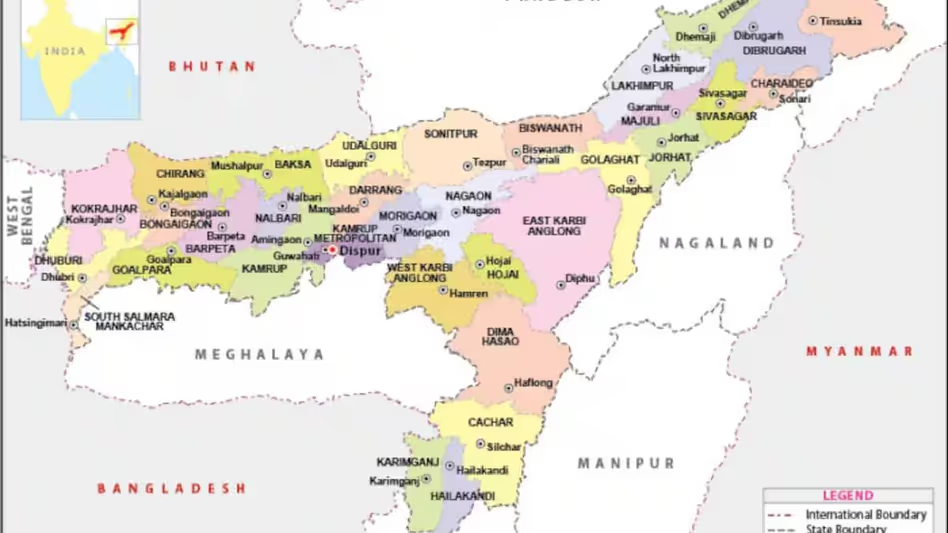The Government of Assam has taken a significant step towards administrative efficiency by announcing the creation of 39 new sub-districts, known as “Xama-Zilla” in Assamese. This move, effective from October 4, 2024, aims to bring governance closer to the people and enhance administrative operations across the state. The establishment of these Assam new sub-districts is expected to streamline governance and improve service delivery at the local level.

Background and Purpose of Assam new sub-districts
The decision to establish these new sub-districts is part of a broader strategy to improve governance and administrative efficiency. The new sub-districts will be spread across 21 districts, including Dhubri, Bongaigaon, Kamrup, Nagaon, Biswanath, Lakhimpur, Dhemaji, Tinsukia, Sivasagar, Jorhat, Golaghat, Cachar, Goalpara, Kamrup Metropolitan, Darrang, Morigaon, Hojai, Sonitpur, Dibrugarh, Charaideo, and Karimganj.
Structure and Administration
Each of the 39 sub-districts will have its own headquarters and will be overseen by an Additional District Commissioner. The administrative setup will also include two assistant commissioners and a team of departmental officials and staff. This structure is designed to ensure that the new sub-districts operate efficiently and effectively from the outset.
Key Locations and Headquarters
The new sub-districts will be strategically located to cover various regions of Assam. For instance, Dhubri district will have two Xama-Zillas named Bilasipara and Golakganj. Bongaigaon will have Abhayapuri, while Kamrup will have Rangiya. Nagaon will feature Kaliabor and Raha, and Biswanath will include Gohpur and Behali.
Other notable sub-districts include:
- Tinsukia: Margherita, Sadiya, and Doomdooma
- Sivasagar: Nazira and Demow
- Jorhat: Titabor
- Golaghat: Bokakhat, Sarupathar, and Dergaon
- Cachar: Lakhipur
- Goalpara: Goalpara West with Agia as its headquarters
- Kamrup Metropolitan: Dispur, Dimoria, New Guwahati, and Jalukbari.
Benefits and Implications
The creation of these new sub-districts is expected to bring several benefits:
- Improved Governance: By decentralizing administrative functions, the government aims to make governance more accessible and responsive to local needs.
- Enhanced Efficiency: The new administrative units will help streamline operations and reduce the burden on existing districts.
- Economic Development: With dedicated administrative units, there is potential for more focused development initiatives, which can drive economic growth in these regions.
Challenges and Considerations
While the establishment of new sub-districts is a positive step, it also presents certain challenges:
- Resource Allocation: Ensuring that each sub-district is adequately resourced in terms of personnel, infrastructure, and funding will be crucial.
- Coordination: Effective coordination between the new sub-districts and existing districts will be essential to avoid administrative overlaps and ensure smooth operations.
Related Reading: Check out the latest news here!
Conclusion
The formation of 39 new sub-districts in Assam marks a significant milestone in the state’s administrative landscape. By bringing governance closer to the people and enhancing administrative efficiency, this initiative has the potential to drive positive change and foster development across the state.
FAQs
What are the new sub-districts in Assam called?
The new sub-districts in Assam are called “Xama-Zilla” in Assamese.
When will the new sub-districts become operational?
The new sub-districts will become operational from October 4, 2024.
How many new sub-districts have been created in Assam?
A total of 39 new sub-districts have been created.
Which districts will have new sub-districts?
The new sub-districts will be spread across 21 districts, including Dhubri, Bongaigaon, Kamrup, Nagaon, Biswanath, Lakhimpur, Dhemaji, Tinsukia, Sivasagar, Jorhat, Golaghat, Cachar, Goalpara, Kamrup Metropolitan, Darrang, Morigaon, Hojai, Sonitpur, Dibrugarh, Charaideo, and Karimganj.
What is the administrative structure of the new sub-districts?
Each sub-district will have its own headquarters and will be overseen by an Additional District Commissioner, supported by two assistant commissioners and a team of departmental officials and staff.
What are the benefits of creating new sub-districts in Assam?
The creation of new sub-districts in Assam is expected to improve governance by decentralizing administrative functions, making them more accessible and responsive to local needs. It will also enhance efficiency by streamlining operations and reducing the burden on existing districts, potentially driving economic development through more focused initiatives.
Who will oversee the administration of the new sub-districts?
Each new sub-district will be overseen by an Additional District Commissioner, supported by two assistant commissioners and a team of departmental officials and staff. This structure is designed to ensure efficient and effective administration from the outset.












